Erstellt am: 31. 5. 2016 - 12:27 Uhr
"One hospital is not enough"
Every day people are being killed in countries such as Syria, Iraq, or Yemen. The numbers of the dead are used as a measure of the "scale" of a particular attack or atrocity. But do we ever stop thinking about the wounded: those lives which carry on, but which will never be the same?
FM4 Reality Check
Hear the programme in the FM4 Player or subscribe to the podcast and get the whole programme after the show
In 2006 the medical charity Médecins Sans Frontières established a hospital in Amman, Jordan, to provide reconstructive surgery for people injured in conflicts across the Middle East. In 2015 MSF moved it to a bigger and upgraded facility in order to better cope with demand.
Since 2006, more than 3,800 patients have been treated at the hospital, and more than 9,200 surgeries have been performed.
To find out more about the project, the patients receiving treatment and the surgeons and other staff working there, Reality Check spoke to MSF Head of Mission in Jordan, Marc Schakal:
Who is being treated in the hospital?
We have patients coming from Iraq, Syria, and Yemen mainly, victims of violence and war in their home country. We’re trying to respond to the general turmoil here in the Middle East, and to provide reconstructive surgery for these people, victims of violence.
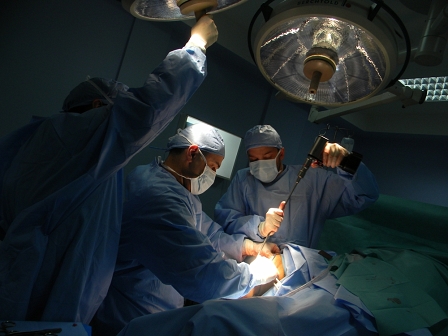
MSF / Enass Abu Khalaf-Tuffaha
Can you give me some examples of the kinds of operations that your surgeons are performing?
We have three specialisations in our hospital in Amman: orthopaedic, plastic, and Maxillofacial surgery. When we talk about reconstructive surgery it means that we are dealing with a long-term wound. Sometimes people were wounded months or years ago and were originally treated in an emergency setting in their home country. They need further reconstruction, to help them recover, to reduce a handicap, to improve their lives.
For example we are dealing with burns, linked to blasts or bombings. We have patients with bullet injuries, with blast injuries, all kinds of weapons-related injuries.
They are complex injuries because they are related to severe trauma. It’s sometimes multiple-site injuries because a blast hurts you in several places, leaving fragments of the bones inside the body that need to be properly removed and disinfected and so on. We have people with a high risk of infection and we have people who are already infected coming to our hospital. These infections are also quite a challenge to manage because we need high range antibiotics for that, and sometimes the antibiotics are not enough and the infection needs to be treated through surgical procedures.
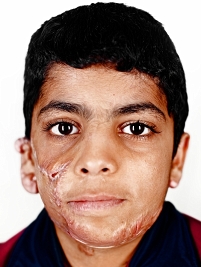
MSF / Lee Hoagland
We try as much as possible to help people recover functionality. For example we have face injuries, people with severe disfigurements, people whose jaw has been completely destroyed. It’s a very complex and long surgical procedure to replace the jaw bone for example, and to do dental implants so that the patient is able to talk again and eat solid food.
We also see wounds where part of the bone has been completely destroyed, leaving a gap of several centimetres where the bone in the leg is not connected. We try to reconstruct by doing bone cultures, helping the bone to grow in a well-aligned way so that the patient is able to use his leg and to walk again.
And for your patients it’s not just a question of the surgery, you’re also providing psychological help, physiotherapy?
Yes - the rehabilitation centre is a valuable part of the treatment we offer. The patients stay for several weeks and sometimes months, to receive physiotherapy treatment. This helps people recover movement and to become more autonomous in their daily life with things like eating, turning on a tap, washing themselves.
How do your patients come to you, how do you identify the people who need your surgery and your care?
In Iraq, for example, we have a network of doctors who are working for MSF around the country. They work with hospitals and have their own network of surgeons. They identify patients, war-wounded, or victims of violence who have been treated but who do not have access to further post-operative care and rehabilitation. These doctors put together the file and send it to us for assessment, and then we can start the process for admission. It’s the same model in the other countries.
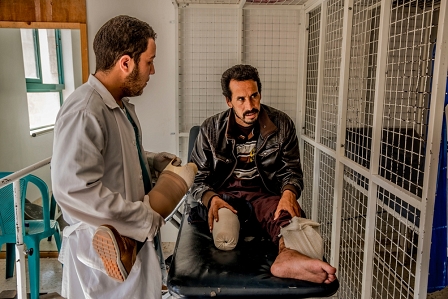
MSF / Juan Carlos Tomasi
How much more work would there be for you if all those who needed the kind of care that you’re offering actually made it to your hospital?
It’s an interesting question but I cannot give you a figure. There are a lot of wounded people due to the context of the countries in the region. Today we talk about probably a million wounded people inside Syria. In Iraq it’s difficult to give a figure but there are bomb blasts, shelling and fighting going on every day in these countries. Even if the war were to stop tomorrow, there are definitely thousands and thousands of wounded people who need reconstructive surgery to be able to recover. Definitely one hospital is not enough in this situation. We have one in Amman, and the instability in some countries doesn’t allow us to do more, but we will try to scale up and upgrade our activity here in Amman as much as we can.
Can you give us a sense of what this treatment means for the patients?
We try to provide patients with complete information before they arrive in Amman, so they know what the treatment entails and how long it takes. Sometimes it’s multi-stage and they come and spend a few months in Amman, they go back home, and they come back for a second or third stage later.
It is painful and it is also psychologically difficult because they are away from their families, they are alone, they spend weeks in a hospital environment, which is not easy, so we have psychosocial support for these patients. Our doctors in the countries of origin who identify the patients are in charge of following up when the patients are back at home. So we follow our patients up to one year and sometimes more after the treatment to make sure there are no complications and to see how the recovery process is progressing.
We try to measure the outcome of our surgery in the life of the patient. There are some objective measures, and some subjective ones. In general we try to help people recover functionality, this is measurable, and then it’s the patient himself who expresses his satisfaction, his autonomy, his capacity to find work after the surgery. Fortunately up to now we have a high rate of success.
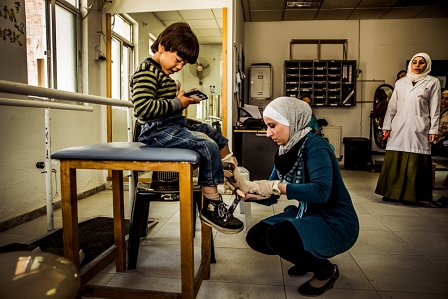
MSF / Juan Carlos Tomasi
Are there any patients you’ve met personally whose stories have touched you?
We have many patients who have touched us; all the patients have their stories. Of course the most moving stories are about children who have lost their parents or who have witnessed violence, or who have lost the regular landmarks from their life. The difficult cases are the patients who are badly disfigured because it impacts a lot the way they are perceived by others.
We have a nice success story of one kid who liked to play football and who lost his legs. So we did a long surgery to manage good quality prostheses. It was very nice for all the team to see him walking after several months of treatment. So patients who come with amputated limbs from former treatment leave hospital able to walk and this is very, very nice.
This reconstructive surgery you’re doing is a very different focus to MSF’s main mission, which is providing emergency medical aid...
That’s right. It doesn’t stop us providing emergency aid where it’s needed, but we have identified here in the Middle East a gap in reconstruction and rehabilitation. It’s not just about closing the wound, things we do in emergency mode, it’s also working on the long-term consequences of the wound and helping people recover. The level of care that is available in some countries is about life-saving, the emergency plans in some hospitals in Iraq are very good but once the wound is closed they discharge the patient very quickly and then the patient is left alone with little post-operative care. The added value of our project is to follow up, to propose further surgery and to try to help people accept their wound and be able to live with it in the long term.
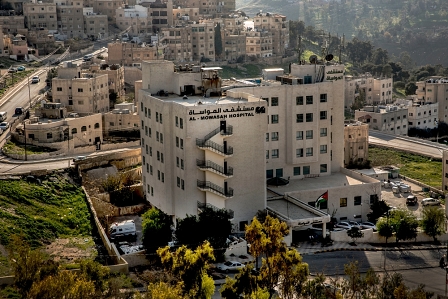
MSF / Juan Carlos Tomasi



